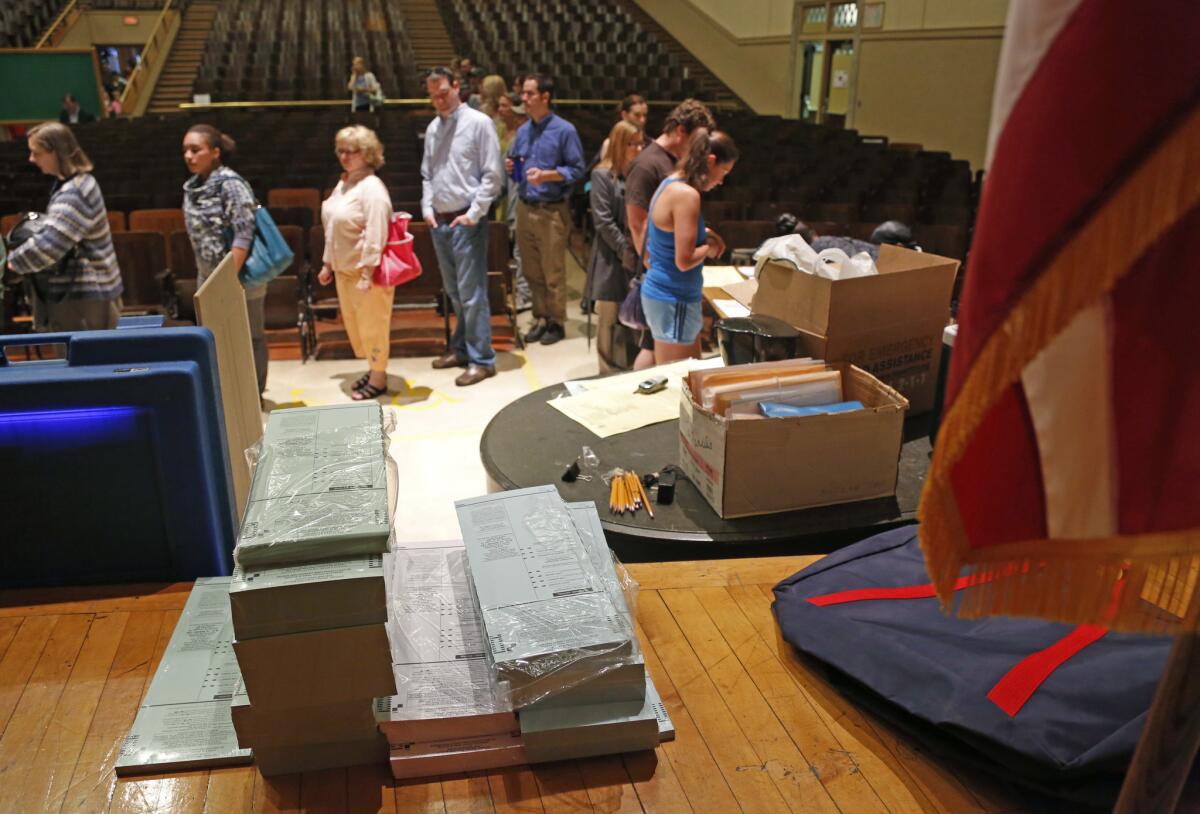ACLU asks Supreme Court to block Wisconsin voter ID law

- Share via
Reporting from Washington — Civil rights lawyers filed an emergency appeal with the Supreme Court on Thursday seeking to block Wisconsin from enforcing a strict voter ID law they say could prevent as many as 300,000 of the state’s registered voters from casting a ballot next month.
Attorneys for the American Civil Liberties Union argue it is too late in the election year for the state to put the voting rule into effect.
The law requires nearly all voters to have a state driver’s license or U.S. passport with a current photo. Critics say tens of thousands of elderly and low-income voters who do not drive cannot be expected to obtain the IDs with less than five weeks before the election.
Separately on Wednesday, a federal appeals court blocked part of a North Carolina law that would end same-day registration and make it harder for students to vote outside their hometowns. The judges said these new restrictions would have a discriminatory effect on African Americans.
Wisconsin officials said that their voter-ID rule -- adopted in 2011 -- is not new, but had been delayed by state and federal court challenges until Sept. 12, when an appellate court cleared the law to take effect.
The state has acknowledged it may take weeks for residents who were born outside of Wisconsin to obtain a birth certificate needed to process an ID. In addition, thousands of voters have already sent in absentee ballots without a copy of the now-required photo ID, raising questions about the validity of the votes.
“This is a recipe for chaos,” Dale Ho, director of the ACLU’s Voting Rights Project, said Wednesday.
The emergency appeal will test whether the conservative-leaning Supreme Court will stand in the way of a popular voting restriction that has been championed by Republicans. Wisconsin’s law was backed by Republican Gov. Scott Walker, who is locked in a tight reelection race.
In a similar case on Monday, the high court voted 5-4 to allow Ohio to shorten its early voting period by one week. Democrats opposed the change, saying their supporters are most likely to take advantage of early voting.
Wisconsin’s state’s lawyers said last month the “voter ID law will have little impact on the vast majority of voters” because “more than 90% of Wisconsin’s registered voters already have a qualifying ID.”
But U.S. District Judge Lynn Adelman, a Democratic appointee, ruled earlier this year that Wisconsin’s law violated the Voting Rights Act by disproportionately hurting African American and Latino voters. He concluded that more than 300,000 of the state’s registered voters, about 9% of the electorate, did not have the type of photo ID card required by the law.
Adelman said many of Wisconsin’s residents who do not drive would have difficulty rounding up the needed documentation and criticized the state’s lawyers for being unable to “point to a single instance of known voter impersonation occurring in Wisconsin at any time in the recent past.”
Last month, a three-judge panel of the 7th Circuit Court of Appeals in Chicago, all of whom were Republican appointees, reversed Adelman.
The Chicago-based panel noted the Supreme Court in 2008 upheld a “comparable” Indiana voter-ID law. The justices said in that case that they had seen no evidence that any Indiana voter would be barred from casting a ballot because of the requirement.
The ACLU appealed the panel’s decision to the full 7th Circuit Court. Last week judges split 5-5, issuing dueling opinions.
Judges who sided with Wisconsin said voters who did not have a driver’s license “have had more than three years to get one.”
Speaking for those opposed, Judge Ann Williams said it was “shocking” the state would “brazenly” defend the law by saying more than 90% of its voters would not be affected. “The right to vote is not the province of the just the majority,” she wrote. “It is not just held by those who have cars and so already have a driver’s licenses and by those who travel and so already have passports. The right to vote is also held, and held equally, by all citizens of voting age.”
In the North Carolina dispute, state officials said they were also likely to file an appeal to the Supreme Court to restore their new voting rules.
In a 2-1 decision, the 4th Circuit Court of Appeals ruled that North Carolina’s law -- passed last year by the state’s Republican-controlled Legislature -- violated the provision of the Voting Rights Act that prohibits discrimination based on race.
“There can be no doubt that certain challenged measures in House Bill 589 disproportionately impact minority voters,” wrote the court in a 69-page decision. The decision also orders a district court to block a provision of the new law that bans out-of-precinct voting.
“We are pleased with the circuit court’s ruling today,” the Rev. Dr. William J. Barber II, president of the North Carolina NAACP, said in a statement. “The evidence clearly showed that, under North Carolina’s voter suppression law, African Americans would have faced higher barriers to the ballot this November, and the court took an important step to ensure that this election will remain free, fair and accessible to all North Carolina voters.
Kurtis Lee in Los Angeles contributed to this report.
More to Read
Sign up for Essential California
The most important California stories and recommendations in your inbox every morning.
You may occasionally receive promotional content from the Los Angeles Times.











